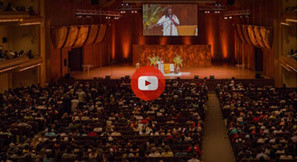
See, if you are able to meditate effortlessly by remembering someone or something, then that is alright.
Maharishi Patanjali has mentioned in the Yoga Sutras (a treatise on the eight limbs of Yoga) that if you are able to meditate by remembering or contemplating upon an image of someone, or something that is very dear to you, then that is alright.
There are many approaches to meditation.
Here (in the Advanced Meditation Course), by saying that everything around you is hollow and empty, we bring the mind that is turned outwards (to the material world) back inwards to its source. When you become aware that everything around you is hollow and empty, then a deep realization dawns within you.
So meditation is that which happens very effortlessly. But if, while you sit for meditation, you make efforts to remember Gurudev’s image and how he looks, then meditation will not happen.
There is a tradition in which people are taught to meditate by contemplating upon some form.
In the Yoga Sutras it is said, 'Vitraag vishayam-va chittam'. It means that just by thinking about an enlightened and dispassionate soul, one can go deep into meditation. That is why one goes into meditation just by thinking about the Guru. This really does happen, and it is alright. But you need not strain yourself so much to think of the Guru in order to meditate.
Once you are connected with the Master, when you heart becomes one with the Master, and when love dawns from within you, then meditation happens effortlessly.
It is how it was with the Gopis (the womenfolk of Vrindavan where Lord Krishna spent his early years), who were so totally in love with Lord Krishna. The Gopis never made any effort to meditate. They were so soaked in their love for Lord Krishna that they would effortlessly slip into meditation. The moment there is deep love, meditation just happens.
The other approach is that which was taught by Lord Budhha. For meditation, Lord Buddha would say that 'Everything around you is temporary and transient. Nothing will last forever. Just remember that it will all disappear one day'.
So this is another way to meditate.
When you are listening to whatever I am saying, your mind is the one that is listening through your ears. When you listen to music, you hear it through your mind.
But when you ask questions about something, you do so through the intellect. So it is the mind that is responsible for listening to the music that is playing; it is the mind that experiences the hotness or coldness of touch. But the faculty, or the level of existence that tries to understand what you experience (through the mind), is the intellect.
Then, when you feel, 'I want this', or, 'I don't want this', then that 'I' reflects the ego.
Remembering this entire experience is the function of the memory.
These are really four different functions of one consciousness.
To get there, at least make yourself hollow and empty first. First you must become hollow and empty like a flute. Then you will see that the harmony of the Divine will flow through you.
This is why in the great tradition of our Masters, it is said, 'Neti Neti' (not this, not this). It means, 'It (Divinity) is not this, and it is not that also'. So in this way, they went on negating and rejecting every limited understanding of God, until they finally realized that everything is One Consciousness, and there is nothing beyond it.
God is not a person or some limited form, He is the Supreme power behind everything in this creation. God is the melodious harmony playing through this entire Creation. But to be able to recognize and listen to His music, you first need to become hollow and empty (meaning to drop one’s limited concepts, small desires and understanding).
This is why it is necessary to experience and become aware of that emptiness first. Only then will you be able to experience the totality of the Divine.
There is no need to feel guilty at all. See, you started following a particular spiritual tradition sincerely and did a lot of good service there, as a result of that you got the gift of coming to this tradition. But once you are practicing the meditation practices of this tradition (of The Art of Living), I would suggest you to not mix up them up with what you were doing earlier.
Do not try to change or mix the techniques taught here with some other ones you have learnt before. Follow the techniques and the approaches taught here as you have learnt it. You are also receiving the knowledge from that spiritual tradition, so continue to do so and honour it.
All knowledge is one – the knowledge of the Self. It is just expressed in different ways by different people and spiritual traditions.
If you really look at it, there is no conflict between any spiritual traditions. It is just a trap of the mind, so you need not worry about this and take it too much to heart. Honour everyone and every tradition, but follow one spiritual tradition with all sincerity.










